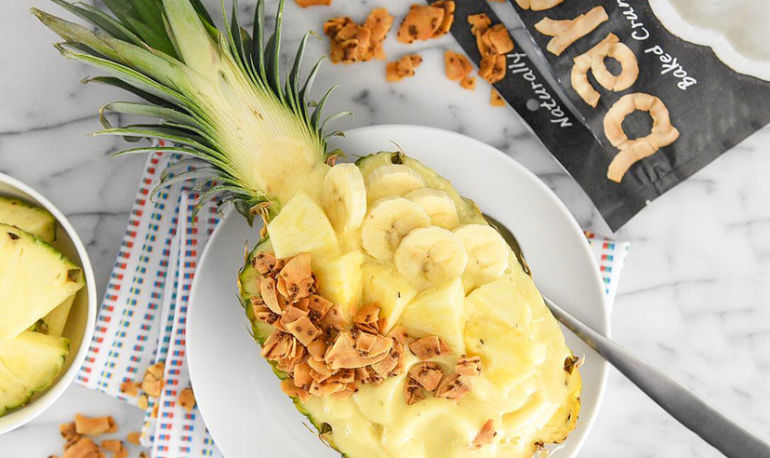
2017 has been a banner year for healthy foods, with innovations in snacks, oils, desserts, and more. Whether you want chocolate that helps with weight loss or chips that heal your gut, this list of the best of the year so far has you covered.
Eating Evolved Keto Cups
Whether you're dabbling with a keto diet or you just want to embrace healthier dessert options, these cups are a deceptively healthy delight. Eating Evolved is committed to embracing the motto "Chocolate: It's Food, Not Candy," and these cups do just that, with only four simple ingredients (organic cacao, organic coconut butter, MCT oil, and vanilla extract). Keep a stash in your freezer for whenever a chocolate craving strikes, and you'll never reach for the too-sweet stuff again.
The Coconut Cult Coconut Yogurt
The yogurt that's taken Instagram by storm. Each of these dairy-free quarts contains over 800 billion human-strain probiotics. Meant to be consumed more as a supplement than as straight yogurt, it's delightfully tangy (almost effervescently so) and pretty damn addictive. It also completely changed my digestion (read more about that here).
Bonafide Provisions Drinkable Veggies
These bone-broth-spiked beverages provide the perfect antidotes to the sometime cloying sweetness of many bottled juice products, instead embracing the savory side of ingredients like spring peas, butternut squash, beets, red pepper, and more. The collagen in the bone broth will help heal your gut lining, but more, you'll have any midafternoon cravings quelled by the amazing umami flavor. You can consume hot or cold.
Farmhouse Culture Kraut Krisps
If there's a better way to get your probiotics than a savory, crunchy chip, I haven't yet found it. The first ingredient in these chips is dried sauerkraut, which may sound strange but adds just the right amount of tang to each bite. Each gluten-free serving contains 1 billion CFUs of probiotics, and the flavors, which mimic the Farmhouse Culture sauerkraut types, are out of this world. Try the Dill Pickle or the Zesty Garden Veggie—you won't be disappointed.
Vital Proteins Collagen Beauty Water
My obsession with collagen runs deep (I started drinking it to heal my gut, and it's since worked wonders on my hair, skin, and nails), and this new beauty water line is a genius way to incorporate it into any routine. It contains collagen, probiotics, and hyaluronic acid, which helps skin retain moisture. The flavors of the line are fabulously spa-worthy, with Lavender Lemon, Melon Mint, and Cucumber Aloe. They can be added to smoothies or simply dissolved in water and drunk on their own, preferably while you're wrapped in a fluffy robe.
Simple Mills Chocolate Chip Crunchy Cookies
These ready-made chocolate chip cookies have one of the simplest, healthiest ingredient lists around, based around a prebiotic-rich tigernut, coconut, and almond flour blend. There's no refined sugar, no gluten, and no artificial flavor or preservatives (they use only a bit of rosemary extract to keep these cookies fresh). The flavor, though, is pure delight, with a snappy crunch and sweetly childhood-inducing bite.
Bare Chia Coconut Bites
These chia-studded crispy bites are the perfect yogurt or smoothie topper, although they're also amazing to eat on their own when you want a crunchy snack. They're sweet, salty, and crunchy, making them oh-so-satisfying for any craving. The chia adds extra fiber and good fat to the coconut's already solid profile, while the flavors (including vanilla and pineapple) add additional interest.
Siete Nacho Chips
These chips are essentially the healthy Doritos of your dreams, with a satisfying crunch and a powdery, finger-coating cheesy flavor. They're made from high-fiber, gluten-free cassava flour and cooked in high-heat-safe, anti-inflammatory avocado oil, and that cheesiness you taste? That's from B-vitamin-rich, totally vegan nutritional yeast. The only problem with these chips is how addictive they are—once you open a bag, you might not be able to stop yourself.
https://www.mindbodygreen.com/articles/best-healthy-snacks-2017









